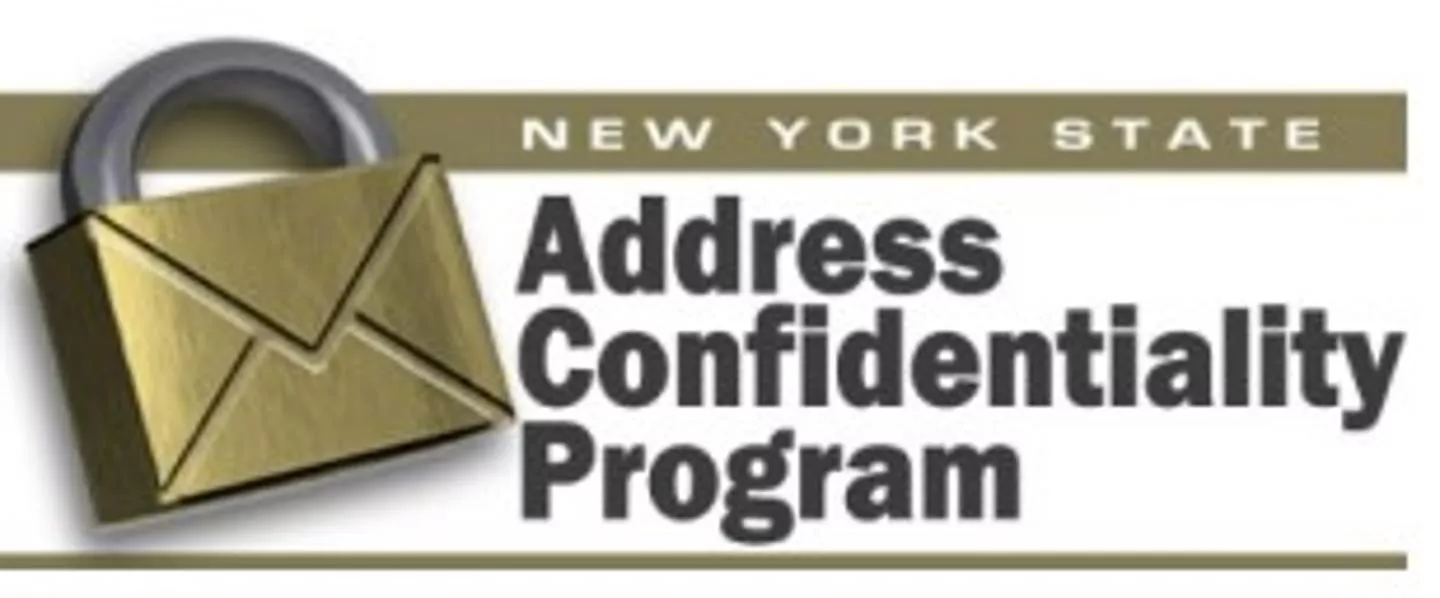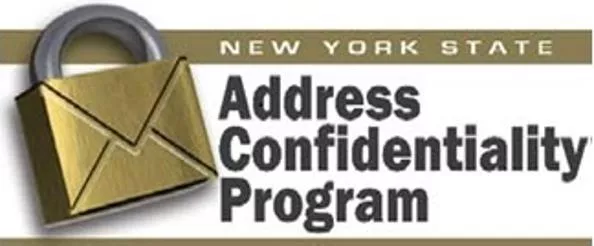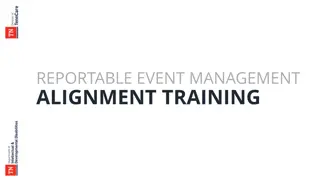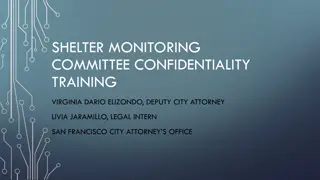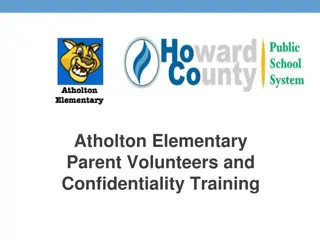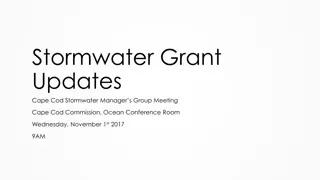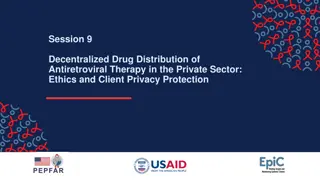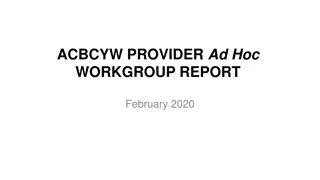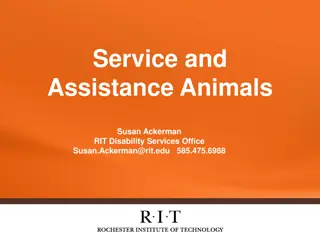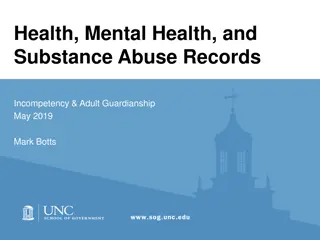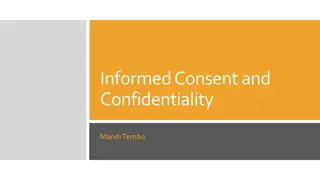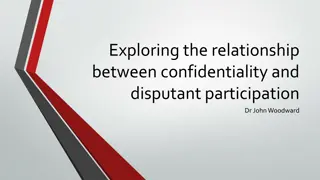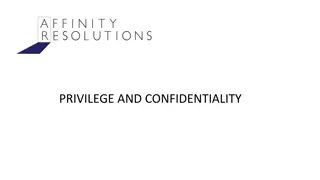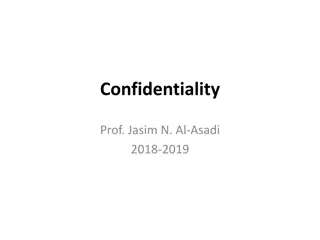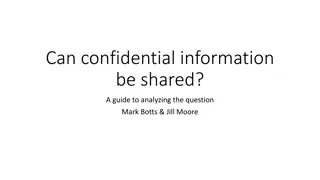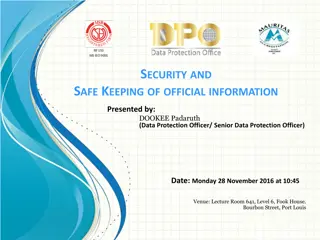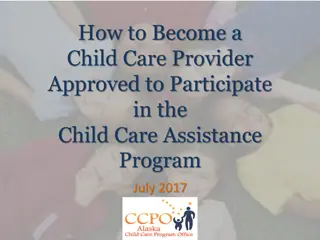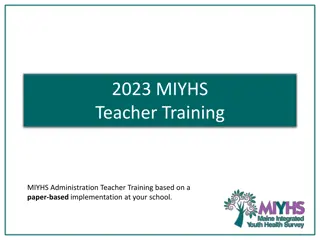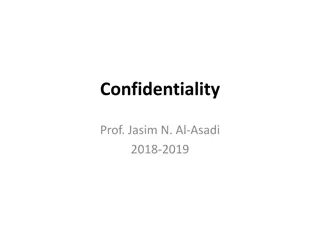New York State Address Confidentiality Program: Application Assistance Provider Tutorial
This tutorial is specifically designed for Application Assistance Providers who will assist potential Address Confidentiality Program (ACP) participants with the application and enrollment process. It covers understanding the ACP, proper form filling instructions, roles of Application Assistance Providers, adherence to program policies, becoming a provider, and an overview of the ACP administered by the NYS Department of State to protect participants' actual addresses for safety.
Download Presentation

Please find below an Image/Link to download the presentation.
The content on the website is provided AS IS for your information and personal use only. It may not be sold, licensed, or shared on other websites without obtaining consent from the author. Download presentation by click this link. If you encounter any issues during the download, it is possible that the publisher has removed the file from their server.
E N D
Presentation Transcript
Welcome to the New York State Address Confidentiality Program tutorial! This tutorial is specifically required for Application Assistance Providers who will aid potential ACP participants with the application and enrollment process. This tutorial will: Help you gain an understanding of the Address Confidentiality Program (ACP) Provide instructions on properly filling out forms. Start
APPLICATION ASSISTANCE PROVIDERS Application Assistance Providers are: State, local or nonprofit agencies that provide counseling, referral, shelter or other specialized services to victims of domestic violence, victims of stalking, victims of sexual offenses, victims human trafficking and Reproductive health care services providers (RHCSP), employees, volunteers, patients, or immediate family members of RHCSPs. Designated by the Secretary of State to assist persons applying to be program participants What will be your role as an Application Assistance Provider? Next
APPLICATION ASSISTANCE PROVIDERS Agree to adhere to the policies, procedures and directions of the Program. The application assistant must agree to not discriminate against any client, or potential program participant, because of race, creed, color, national origin, gender, sexual orientation, age, or mental, physical or sensory disability. Application assistant training shall be valid for two years. What will be your role as an Application Assistance Provider? Next
APPLICATION ASSISTANCE PROVIDERS To become an Application Assistance Provider, an application must be completed and submitted. Application forms are available at the Address Confidentiality Program portal What will be your role as an Application Assistance Provider? Next
ADDRESS CONFIDENTIALITY PROGRAM OVERVIEW ACP is a program administered by the NYS Department of State and helps participants stay safer by shielding their actual address. The program has three components: 1. Provides a legal substitute address to participants that they may use in lieu of a home, school, or work address 2. Provides a confidential mail-forwarding service What is the Address Confidentiality Program (ACP)? 3. Accepts legal notices (process) on behalf of participants The goal of ACP is to help participants stay safe by protecting their actual address information. The ACP is intended to be an addition to a comprehensive safety plan, not a substitute for it. It is one facet in an overall safety plan for a participant to stay safe. Next
ADDRESS CONFIDENTIALITY PROGRAM OVERVIEW The program is available to victims who have had to move or are planning to move to a new location for safety reasons. Who may participate in the Address Confidentiality Program? Next
ADDRESS CONFIDENTIALITY PROGRAM OVERVIEW Participants of the program may be victims of: Domestic Violence Stalking Who may participate in the Address Confidentiality Program? Kidnapping (effective date 11/15/2022) Human Trafficking Sexual Offenses Next
ADDRESS CONFIDENTIALITY PROGRAM OVERVIEW Participants of the program also includes Reproductive Health Care Service providers, employees, volunteers, patients or immediate family members of such providers. Who may participate in the Address Confidentiality Program? Reproductive Health Care Service providers do not have to relocate. Next
ADDRESS CONFIDENTIALITY PROGRAM OVERVIEW Anyone living in the same household as the participant may also be eligible; such as children, parents, or siblings. Who may participate in the Address Confidentiality Program? Participation is limited to New York State residents. Next
ADDRESS CONFIDENTIALITY PROGRAM An ACP application must be completed and submitted. Application forms are available at the Address Confidentiality Program portal Application process and use of the program See: Instructions for completing ACP application Next
ADDRESS CONFIDENTIALITY PROGRAM Once enrolled, the participant is issued an ACP ID card, with a legal substitute address to use in place of their physical address. The substitute address is now the participant s legal address of record. This address must be accepted by all State and local agencies. Application Process and Use of the Program Participant Identification Card Pursuant to Executive Law 108 the following person is certified as a participant in the Address Confidentiality Program and is entitled to use the following substitute address: Participant Name ACP 1234 P.O. Box 1110 Albany, 12201-1110 Expiration Date: MM/DD/YYYY Next
ADDRESS CONFIDENTIALITY PROGRAM As new participants start using their substitute address, their mail will start arriving at the Address Confidentiality Program Mail center. Application Process and Use of the Program Next
ADDRESS CONFIDENTIALITY PROGRAM The mail will confidentially be forwarded (at no cost) to the participant s actual address (third- class mail such as catalogs, magazines and junk mail will not be forwarded). Neither will packages unless clearly marked as being sent from a governmental agency or it is prescription medication. Application Process and Use of the Program Next
ADDRESS CONFIDENTIALITY PROGRAM Forwarded Mail: 1.First Class Mail 2.Legal Documents Examples of First-Class Mail: Application Process and Use of the Program Certified Letters Express mail Personal Correspondence Bills/statements of accounts Next
ADDRESS CONFIDENTIALITY PROGRAM SERVICE OF PROCESS: The New York Secretary of State acts as the statutory agent for service of process for participants in the Address Confidentiality Program. Service of process is accepted pursuant to Executive Law 108. Please note that nothing in this section of law affects the right to serve process in any other manner permitted by law. Application Process and Use of the Program Next
ADDRESS CONFIDENTIALITY PROGRAM What is the Address Confidentiality Program (ACP)? The ACP is a program designed to offer victims of domestic violence, victims of stalking, victims of sexual assault, victims of human trafficking and reproductive health care services providers, employees, volunteers, patients, or immediate family members of reproductive health care services providers a way to shield their FAQS? actual address and to prevent someone from locating them through public records. It is part of an overall safety plan. What does the ACP do? 1) Provides a legal substitute address for ACP participants to use as their residential, work, or school address. All local and state government agencies are required to accept this address. 2) Receives the participant s first class, certified, and registered mail and forwards it to the participant s actual confidential address at no cost to the ACP participant. 3) Accepts process (legal notices) on behalf of the participants and forwards it to their confidential address. Next
ADDRESS CONFIDENTIALITY PROGRAM Who is eligible for the ACP? Victims of domestic violence, victims of stalking, victims of sexual assault, victims of human trafficking and reproductive health care services providers, employees, volunteers, patients, or immediate family members of reproductive health care services providers who are in fear for their safety and have moved to an undisclosed FAQS? location. A parent or legal guardian acting on behalf of a minor, or a legal guardian acting on behalf of an incapacitated person, may apply. How do victims apply for the ACP? All potential participants may apply for the program by completing an application and submitting it directly to the ACP at the address on the web-site (www.dos.ny.gov/address-confidentiality) or they may apply with the help of an application assistant. A list of participating agencies is on the ACP web-site. Next
ADDRESS CONFIDENTIALITY PROGRAM What is an Application Assistant? The registered ACP Application Assistant is a person who provides counseling, referral or other services to victims of domestic violence, victims of stalking, victims of sexual assault, victims of human trafficking and reproductive health care services providers, employees, volunteers, patients, or immediate family members of reproductive FAQS? health care services providers. All Application Assistants receive required ACP training and go through a registration process. The Application Assistant provides information to the applicant, assists in determining program eligibility, and recommends eligible individuals to the Address Confidentiality Program. Can other household members participate in the ACP? Yes. Household members who reside with the primary applicant may be included in the program. This includes the victim s minor children and other adults. An adult over the age of 18 years that is included on the primary application will need to authorize, agree and sign the application along with the primary applicant. Next
ADDRESS CONFIDENTIALITY PROGRAM What kind of mail is forwarded? All first class, registered, and certified mail addressed to the ACP participant s substitute address will be forwarded to the confidential address at no cost to the participant. ACP will not forward packages, periodicals, and catalogs, unless clearly identifiable as pharmaceuticals (prescription drugs) or indicate they were sent by a government FAQS? agency. What happens after a person is accepted into the ACP? Once accepted into the ACP, participants will receive a letter from the program along with their ACP Authorization Card. The participants may then begin using the substitute address. How long are participant s certified to be in the program? Upon acceptance into the ACP, participants are certified for four (4) years. After the four- year period, they may reapply. ACP will send a reminder notification to participants prior to the expiration period. Next
ADDRESS CONFIDENTIALITY PROGRAM Can someone be cancelled from the ACP? Yes. Participants may voluntarily withdraw from the program. Staff will assist in completing the necessary steps to be withdrawn from the program. ACP may also cancel a participant s certification if: the participant s mail is returned as non-deliverable ; ACP is not notified of a change of address, phone number or name within the allowable time frame; or a participant knowingly provided false information on the FAQS? application. Who is required to accept the substitute address? All State and local agencies must accept the ACP substitute address as the participant's actual residence address. The participant may also use the substitute address for all personal first-class mail. The fewer people that know where the victim actually lives, the more effective ACP will be. Where is the substitute address? The substitute address is a Post Office box located in Albany, New York and is only for the receipt of mail. The substitute address for program participants has no relation to their actual address. Next .
ADDRESS CONFIDENTIALITY PROGRAM Will my mail be delayed? Mail received at the designated address will be forwarded on a same-day basis, via first-class mail, to the mailing address provided by the participant Monday through Friday (excluding holidays). Participants should expect a delay of a few days in receiving their mail. Will my actual address be secure? A program participant's records are maintained as confidential and cannot be FAQS? released by the ACP manager unless directed by a court of law or requested by a law enforcement agency for a legitimate law enforcement purpose. What happens if I move or change my name? The ACP Manager must be notified within 10 days of a change in residential address or name. Failure to do so may result in cancellation from the program. What do I do if someone refuses to use the substitute address? Please ask the individual or organization to contact the ACP at (518) 474-7306 or toll free (855) 350-4595 for more information about the program. Participants are instructed not to provide their confidential physical address and at all times are encouraged to contact ACP if there are any problems or misunderstandings concerning the program. Next .
ADDRESS CONFIDENTIALITY PROGRAM How do participants register to vote? Participants should contact the Board of Elections directly for assistance in voting without disclosing their actual address. NYS BOARD OF ELECTIONS 40 NORTH PEARL STREET, SUITE 5 ALBANY, NY 12207-2729 (518) 474-6220 www.elections.state.ny.us/ FAQS? Does the ACP remove or delete existing public information? No. The program is not able to delete information that already exists in public records. Is the ACP like a witness protection program? No. The program does not hide participants or help them go underground , change their identities, social security numbers, or location. Next
ADDRESS CONFIDENTIALITY PROGRAM Can I give my confidential residence address out to anyone? You will have to decide when and to whom you will give your confidential address. The fewer people who know your actual location, the more likely your information will remain confidential. It is advisable not to give your actual residence address to anyone unless it is absolutely necessary. If a residential address is required by a utility company, you may ask that they place a password on your account for safety purposes. FAQS? Any person in Family Court can ask to keep his or her address confidential from the other person. This means that your address is kept secret and not given to the other person. This is important because all court papers have your address on it and the other person gets a copy of the court papers. . Next
ADDRESS CONFIDENTIALITY PROGRAM CONFIDENTIAL ADDRESS IN FAMILY COURT How to Apply There are procedures to help you keep your address confidential. You must get an Address Confidentiality Order or be an approved participant in the NYS Address Confidentiality Program for your address to be kept confidential. 1. Tell the Family Court clerk that you would like to keep your address confidential. The clerk will give you an "Address Confidentiality Affidavit" that must be filled in and signed. If the Court gives you an Address Confidentiality Order, then your address will not be printed on any court papers. 2. New York State has an Address Confidentiality Program. This is a free program for victims of domestic violence who have had to move or are planning to move to a new location for safety reasons. If approved for the program, your address is kept secret on court papers, government records, driver's licenses, and applications for services like unemployment insurance and public assistance. You must apply and enroll to use this program. FAQS? What a Confidential Address Means If you get an Address Confidentiality Order or are a participant in the NYS Address Confidentiality Program then your address will be listed as "Confidential" in the court file and on all Family Court papers and any papers sent to the other person. Next
ADDRESS CONFIDENTIALITY PROGRAM If you have an Address Confidentiality Order, the court papers will be sent to your "designated agent for service." This person can be a lawyer, any person over 18 years of age, or the Clerk of the Family Court. The agent is responsible for getting the papers to you. If you are participating in the NYS Address Confidentiality Program, the court papers will be sent to the Secretary of State in Albany and it will be forwarded by certified mail to you. FAQS? Next
ADDRESS CONFIDENTIALITY PROGRAM ADDITIONAL INFORMATION FOR PARTICIPANTS: Upon enrollment, an ACP participant should notify the US Postal Service to have mail forwarded from their old address to the ACP substitute address. This is the only time an ACP participant should notify the US Postal Service of their address change. Is A Person s Participation in the ACP Confidential? The fact that a person is participating in the ACP is not confidential. If asked, the ACP will verify program participation and that the ACP substitute address is the legal mailing address of the participant. The actual address of the participant remains confidential. How can a Participant Keep their Address Confidential with the Utility Companies and other Agencies that Require a Physical Address? The ACP law requires state and local government to accept the use of the substitute address for any public record that is created or updated on behalf of a program participant. It is recommended that a participant request that all agencies from which s/he receives services to accept the substitute address. Although private companies do not have to accept the substitute address, many businesses will be willing to do so. Don t hesitate to ask them to use the substitute address. The phone company, oil company and power utility all need to know where the home is for service purposes and, therefore, require an actual address. In these cases, it is recommended that program participants speak with the customer service supervisor to try to make special arrangements to provide for level of confidentiality. For example, the utility may allow the participant to use an alias name in the database to prohibit access of a program participant s actual name and address. Next
ADDRESS CONFIDENTIALITY PROGRAM Bank Accounts and Address Confidentiality The rules implementing the Bank Secrecy Act require a financial institution to implement a Customer Identification Program that includes procedures that enable it to form a reasonable belief that it knows the true identity of its customers. The rules also require that a financial institution obtain a residential or business street address from each customer. Unfortunately, the substitute address under an Address Confidentiality Program does not meet the standards. The Financial Crimes Enforcement Network issued a letter ruling to help the situation. The Financial Crimes Enforcement Network regulations also allow: If the individual customer does not have a residential or business street address, then the rules permit the individual customer to provide a residential or business street address of next of kin or of another contact individual. In FIN-2009-R003, the Financial Crimes Enforcement Network found: A customer who participates in a state-created ACP shall be treated as not having a residential or business street address and a secretary of state, or other state entity serving as a designated agent of the customer consistent with the terms of the ACP, will act as another contact individual for the purpose of complying with FinCEN s rules. Therefore, a financial institution should collect the street address of the ACP sponsoring agency for purposes of meeting its CIP address requirement . See the Department of Treasury memo at: www.fincen.gov/statues regs/guidance/pdf/fin-2009-r003.pdf for guidance on how ACP participants can use ACP designated addresses when setting up accounts with financial services companies. Next
ADDRESS CONFIDENTIALITY PROGRAM Lease Terminations for Victims of Domestic Violence: Effective August 2007, a tenant shielded by a court order of protection is permitted, on ten days notice to the landlord, to seek a court order terminating the lease, and will be released from any further rental payments after the lease is terminated. The tenant must demonstrate that there continues to be a substantial risk of physical or emotional harm to the tenant or the tenant s child from the party covered by the order of protection if the parties remain in the premises, and that relocation would substantially reduce that risk. The tenant must first attempt to secure the voluntary consent of the landlord to terminate the lease, and if the request is denied, a court may order termination as long as all payments due under the lease through the termination date of the lease have been paid. Real Property Law 227-c. Next
To complete this tutorial, please click the below link for a short quiz .. Address Confidential Program Quiz






